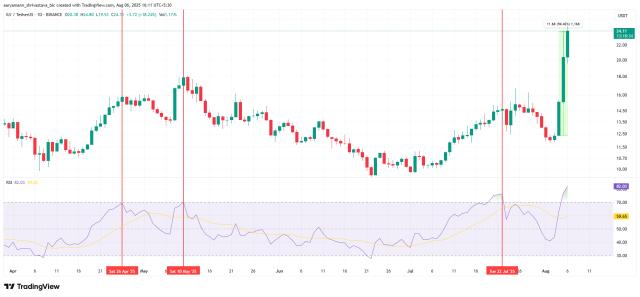From Tsinghua University Scholar to Web3 Pioneer: An Interview with DoraHacks Founder Steve Ngok

On the latest episode of "Bill It Up," host Bill Qian engaged in an in-depth conversation with Steve Ngok, founder and global head of DoraHacks. From a Tsinghua University graduate to a Web3 pioneer, Steve shared his unique insights on hacker culture, the evolution of blockchain, and the potential impact of AI and quantum computing on the crypto world. This article, compiled from that conversation, delve deeper into how DoraHacks drives technological innovation through hackathons and Steve's grand vision for the future of the Web3 ecosystem.
DoraHacks: An innovation engine connecting hackers around the world
DoraHacks is a global developer community platform founded in 2014, positioned as the largest startup incentive platform in the Web3 ecosystem. Steve explained that DoraHacks stands out in the industry for its unique positioning: it doesn't compete with any company or organization, but instead collaborates with major public blockchains and open-source technology platforms to build an open ecosystem and empower developers to start their own businesses.
"DoraHacks' value lies in helping developers start businesses while simultaneously promoting the development of the open source technology ecosystem," Steve said. The platform has already incubated numerous successful projects, including Injective and Polygon (then known as Matic), both of which were launched at the 2018 DoraHacks hackathon. These projects have grown from startups to blockchain unicorns, fully demonstrating DoraHacks' ability to nurture innovative teams.
Compared to Y Combinator (YC), DoraHacks offers greater scalability. YC is known for its high-quality incubation program, focusing on commercial projects with a one-to-three-year launch window. DoraHacks, on the other hand, prioritizes the long-term potential of Web3 and cutting-edge technologies. Furthermore, DoraHacks has a clear focus on quantum computing and blockchain ecosystem development, areas YC has rarely explored.
Hackathon: A barometer of the rise and fall of the blockchain ecosystem
Steve believes hackathons are a crucial indicator of a blockchain ecosystem's health. "Ecosystems that prioritize hackathons and truly provide resources for developers tend to incubate outstanding projects and survive bear markets." He cited Solana as an example, noting that its DoraHacks hackathon successfully incubated projects like Render, Helium, and Photobots AI, capitalizing on the convergence of DeFi and AI and solidifying its position in the ecosystem.
Conversely, some public chains have gradually declined due to a lack of substantial support for developers. For example, some Chinese-backed public chains that collaborated in 2018, such as Ontology and Nebulas, have gradually lost their market competitiveness since 2021. Steve emphasized, "The success of an ecosystem depends on whether it can, through mechanisms like hackathons, identify teams that can truly solve problems, help them survive the bear market, secure financing, and build world-class products."
AI empowerment: From "ambient programming" to hackathon automation
The rapid development of AI technology in recent years has brought new opportunities to DoraHacks. Steve revealed that DoraHacks has launched a product called "Build AI," which aims to improve the efficiency of hackathon organization through AI. Traditional hackathons rely on costly developer relations (DevRel) teams and can only organize one or two events per year. Build AI, by automating competition problem design, project review, and marketing, reduces organizational costs to 1/10th to 1/20th of the original cost, while achieving the remarkable efficiency of hosting one hackathon per month.
"Imagine an AI agent that can help you organize 12 hackathons, covering all the tedious management work, so that the ecosystem can continue to attract developers." Steve said that this product not only transforms DoraHacks' years of accumulated hackathon experience into technological advantages, but also empowers major public chain ecosystems and accelerates the incubation of Web3 projects.
Even more exciting is how AI is changing the role of developers. Steve mentioned an emerging profession: the "Vibe Coder." These individuals, who lack programming expertise, collaborate with AI to develop high-quality products. For example, an app called Call AI, using AI, has gone from zero programming experience to tens of millions of dollars in annual revenue. This "vibe coding" phenomenon has significantly lowered the barrier to entry for entrepreneurs, giving more people the opportunity to become "hackers."
Quantum computing: disruption or opportunity?
Quantum computing is another frontier area DoraHacks is focusing on. Steve believes that 2025 will be the "Ethereum smart contract moment" for quantum computing, marking the entry of quantum software development into practical use. Quantum computing's core strength lies in processing massive amounts of data and accurately predicting things, such as the weather three months from now or stock market trends over the next few years, rather than simply cracking codes.
In response to the question, "Will quantum computing threaten Bitcoin's security?" Steve stated that, in theory, the immense computing power of quantum computers could potentially crack Bitcoin's encryption algorithms or accelerate mining. However, he expressed optimism that the Bitcoin community could mitigate potential risks by introducing quantum-resistant encryption solutions through forks and upgrades. Furthermore, DoraHacks is also exploring quantum blockchains, leveraging quantum computing's unique signature mechanism to create a more secure on-chain system.
"Quantum computing will not destroy Bitcoin, but will promote the further evolution of blockchain technology." Steve emphasized that the real potential of quantum computing lies in replacing the existing AI computing infrastructure and becoming a key technology to subvert traditional computing giants such as Nvidia.
Beyond Web3 and AI: The Hacker Movement in Medical Innovation
In addition to Web3 and quantum computing, DoraHacks also focuses on innovation in the medical field. Steve mentioned that high regulatory barriers from the US Food and Drug Administration (FDA) hinder many small and medium-sized companies from innovating in medicine, such as cancer treatment and gene editing technologies. DoraHacks plans to support the "hacker movement" in this field, fostering breakthrough medical projects and breaking the monopoly of large pharmaceutical companies.
"In the medical field, AI can deduce the permutations and combinations of DNA and mRNA to design new drugs and treatments." Steve gave an example, saying that AI can also help develop cutting-edge technologies such as rocket materials, demonstrating its huge cross-industry potential.
Future Vision: Connecting billions of hackers around the world
Looking ahead, Steve has a grand vision for DoraHacks: "Connecting hackers around the world to solve important and pressing problems." He believes that as AI frees humans from tedious tasks, everyone has the potential to become a creative "hacker." The DoraHacks developer community already has over 200,000 registered users, and is expected to expand to tens or even hundreds of millions in the future.
In the short term, DoraHacks will focus on four major areas:
- Consumer-grade Crypto : Explore the "Pinduoduo" or "Alipay" moments in the Crypto field and drive innovation in payment and social scenarios.
- Automated organization : Empowering public chains and enterprise ecosystems through AI-driven automated services.
- Open source quantum software : deploy quantum computing applications and seize the technological high ground.
- Free Society (Medical Innovation) : Supporting breakthrough medical projects and breaking down regulatory barriers.
Advice to young people: Do big things and don’t be afraid of failure
Steve encouraged post-2000 entrepreneurs to boldly embrace their ventures with the help of AI. "Now is a golden age for entrepreneurship. AI has exponentially lowered the barrier to entry for developers." He advised young people to start from first principles and focus on truly important issues rather than chasing short-term profits.
"Doing big things and doing small things are about the same difficulty, so why not just do big things that can change the world?" Steve quoted the views of Blackstone Group's Stephen Schwarzman, emphasizing that entrepreneurship is the best learning process and failure is also a part of growth.
Conclusion
From a Tsinghua University alumnus to a Web3 pioneer, Steve Ngok has deeply integrated hacker culture with cutting-edge technologies like blockchain, AI, and quantum computing through DoraHacks. His story demonstrates the boundless possibilities of technology-driven innovation and points the way for the future development of the Web3 ecosystem. As he puts it, "Everyone can be a hacker and solve important and pressing problems." For developers, entrepreneurs, and those curious about future technologies, DoraHacks is more than just a platform; it's a bridge connecting dreams and reality.








